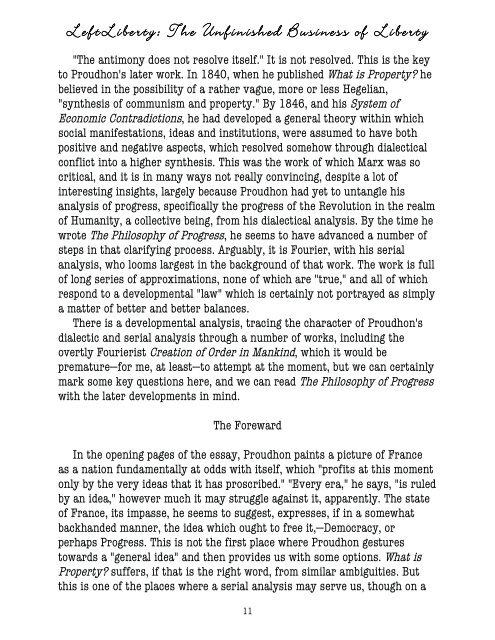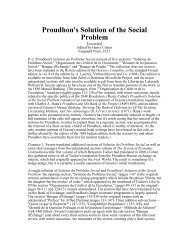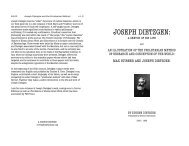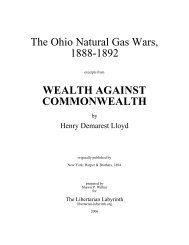LeftLiberty 1 - The Libertarian Labyrinth
LeftLiberty 1 - The Libertarian Labyrinth
LeftLiberty 1 - The Libertarian Labyrinth
You also want an ePaper? Increase the reach of your titles
YUMPU automatically turns print PDFs into web optimized ePapers that Google loves.
<strong>LeftLiberty</strong>: <strong>The</strong> Unfinished Business of Liberty<br />
"<strong>The</strong> antimony does not resolve itself." It is not resolved. This is the key<br />
to Proudhon's later work. In 1840, when he published What is Property? he<br />
believed in the possibility of a rather vague, more or less Hegelian,<br />
"synthesis of communism and property." By 1846, and his System of<br />
Economic Contradictions, he had developed a general theory within which<br />
social manifestations, ideas and institutions, were assumed to have both<br />
positive and negative aspects, which resolved somehow through dialectical<br />
conflict into a higher synthesis. This was the work of which Marx was so<br />
critical, and it is in many ways not really convincing, despite a lot of<br />
interesting insights, largely because Proudhon had yet to untangle his<br />
analysis of progress, specifically the progress of the Revolution in the realm<br />
of Humanity, a collective being, from his dialectical analysis. By the time he<br />
wrote <strong>The</strong> Philosophy of Progress, he seems to have advanced a number of<br />
steps in that clarifying process. Arguably, it is Fourier, with his serial<br />
analysis, who looms largest in the background of that work. <strong>The</strong> work is full<br />
of long series of approximations, none of which are "true," and all of which<br />
respond to a developmental "law" which is certainly not portrayed as simply<br />
a matter of better and better balances.<br />
<strong>The</strong>re is a developmental analysis, tracing the character of Proudhon's<br />
dialectic and serial analysis through a number of works, including the<br />
overtly Fourierist Creation of Order in Mankind, which it would be<br />
premature—for me, at least—to attempt at the moment, but we can certainly<br />
mark some key questions here, and we can read <strong>The</strong> Philosophy of Progress<br />
with the later developments in mind.<br />
<strong>The</strong> Foreward<br />
In the opening pages of the essay, Proudhon paints a picture of France<br />
as a nation fundamentally at odds with itself, which "profits at this moment<br />
only by the very ideas that it has proscribed." "Every era," he says, "is ruled<br />
by an idea," however much it may struggle against it, apparently. <strong>The</strong> state<br />
of France, its impasse, he seems to suggest, expresses, if in a somewhat<br />
backhanded manner, the idea which ought to free it,—Democracy, or<br />
perhaps Progress. This is not the first place where Proudhon gestures<br />
towards a "general idea" and then provides us with some options. What is<br />
Property? suffers, if that is the right word, from similar ambiguities. But<br />
this is one of the places where a serial analysis may serve us, though on a<br />
11











